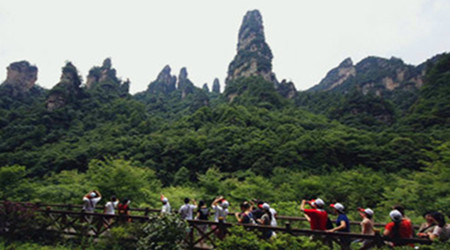4 Days Small Group Zhangjiajie Avatar Tour with Glass Bridge
- Following the 4 Days Small Group Zhangjiajie Tour, you ll visit Avavtar Mountain in Zhangjiajie National Forest Park, Baofeng Lake and Glass Bridge in Zhangjiajie Grand Canyon
Day1: Arrive in Zhangjiajie
Today, you will arrive in Zhangjiajie Hehua Airport or Zhangjiajie Railway Station. Upon arrival, our guide in Zhangjiajie will greet you outside the baggage claim area and send you to the hotel.
Meals: No Accommodation: Zhangjiajie International Hotel 4* in Zhangjiajie
Day2: Zhangjiajie National Forest Park
Today,we will visit Zhangjiajie National Forest Park.
Yellow Stone Village: After breakfast in the hotel ,visit Yellow Stone Village, It lies to the west of Zhangjiajie Forest Park with an altitude of 1200m and covers an area of 250mu. You can enjoy the Six Stranges Pagoda, Picking Star Platform, Five Finger Peak, Lover peaks and so on when you are on the top of mountain.
You will also visit Golden Whip Stream in Zhangjiajie National Forest Park. The canyon Golden Whip Stream flows through is praised as the world's most beautiful canyon. Golden Whip Rock is a large rock gleaming like gold under the sun.
Meals: Western buffet breakfast, Lunch Accommodation: State-guest Hotel 4* in Wulingyuan
Day3: Zhangjiajie
Today we will visit Yuanjiajie Scenic Area by taking the Bailong Elevator. This spot is a highlight of your private Zhangjiajie tour, famous in the world for the Hallelujah Mountains that appeared in the movie Avatar, and the magnificent "The First Stone Bridge in the World".
Then we will take a battery car to visit Tianzi Mountain Nature Reserve, where you could see mountains, grand valleys, and original forests. If you are lucky, you may see the marvelous sea of clouds.
Afterwards, take a small train to visit Ten-mile Gallery. Along the 5km drive there are unique stones forming different shapes, feeling like a natural landscape painting. In the end of day, we will drive you back to your hotel in Zhangjiajie to have a rest.
Meals: Western buffet breakfast, Lunch Accommodation: State-guest Hotel 4* in Wulingyuan
Day4: Zhangjiajie-Departure
After breakfast, our guide will escort you to visit the Grand Canyon Glass Bridge, the longest and highest glass bridge in the world. Then the guide will accompany you to Baofeng Lake, where you will take a scenic boat ride around the lake.
After that, our guide will see you off at the Zhangjiajie Airport. Wish you a pleasant onward journey.
Meals: Western buffet breakfast, Lunch
What to pack?
Tip 1: Take a Chinese Phrasebook
There is such a wide varity of Mandarin phrasebooks on the market. You may choose a useful Chinese phrasebook for Chinese travelers. If you meet any difficulty on your trip without any English speaking people around, you can turn to your Chinese phrasebook for help.
Tip 2: Bring some cash on hand
Cash is widely used in China though credit cards have become more and more popular. Some restaurants and stores don't accept credit cards. If you travel to some remote area, you will find paying cash is the only way of local payment.
Tip 3: Take Hand Sanitizer & Wet Wiper
It is very useful to have hand sanitizers and wet wipers on hand to clean your hands after dining, going to toilet or traveling in some crowded public places. It is advisable to carry alcohol pads to clean the ones in the restaurants.
Tip 4: Prepare for a Electrical Converter and Adapter Plugs
China uses generally 220V, 50HZ, AC (Hong Kong is 200V; Taiwan is 110V). A standard socket in China has two pins on the upper part and earthed three pins on the lower part. You may buy a portable plug adaptor at your home country or here in China. Some of your hotels in China offer free use of plug adaptors.
Some hotels provide bottled water for free, use that even for brushing your teeth. Buy bottled water, or boil your own using the electric water heater found in every hotel room.
Tip 6: Bring Toilet Paper
Always bring tolet paper with you since most of the restrooms in China don't offer toilet paper except hotels.
Tip 7: Prepare for a photocopy of China Tourist Visa
Always prepare for a photocopy of your China tourist visa in case you lose your passport.
Tip 8: Always Carry one of the Hotel's Business Cards
Most hotels in China provide business cards (contact cards on the front desk). Please always take it for an easy return to the hotel.
Tip 9: Don't Forget to Ask for a Local Tourist Map from your Hotel
Most hotels in China provide free tourist maps. These maps are basically more informative than the maps in your China guidebook. But usually your hotel doesn't put them on the hotel front, you have to ask for it!
When to visit China?
Located in South East Asia, China is one of the world’s most-watched and hottest incoming tourist destinations. Normally, April, May, September and October are the peak tourist months at China’s most popular places when the weather is the most comfortable.But deciding when to visit China depends on which places you wish to visit, what type of weather you enjoy, and how much budget you can afford.
China in Spring
China in Summer
Summer in China can be extremely hot with temperatures well above 22° C. You can go to summer resorts in some northern cities of China. Summer is also the rainy season, so travelers should not forget umbrellas, light raincoats and rubber shoes.
China in Autumn
Autumn is a season which is suitable to visit any city of China. Normally, the most comfortable season of the year in China is early autumn (September to early October). During that period, temperatures are reasonable throughout China at about 10° C - 22° C with a limited amount of rain. Autumn is a harvest season. The sky is bright and clear. Your eyes are filled with the most beautiful view of the natural world.
China in Winter
Winter can be incredibly cold especially in the north but off-season travel can also offer its rewards. For example, the Harbin Winter Ice Lantern Festival is a charming event. The southern China in winter is not that cold.
More Tips:
Whenever you decide to travel to China try to avoid 1-3 May (Labor holidays) or 1-7 October (National Day) when hard-working Chinese get a one week holiday; University Holidays: Summer holiday (June-September) and Winter holiday (January-February). It is extremely crowded everywhere, especially in some hot destinations in China.
Important Things about China Tours
Are you going to have a tour to China? Here lists some useful information about China.If you are looking to inquire about a particular China tour in your mind, just submit a quick enquiry, we can offer you an itinerary with prices for your reference. We offer a free enquiry service.
Business Hours in China
Most of China's business world slows down considerably during the spring festival in late January and early February. Business visitors would be wise to avoid this two to three week holiday period.
In most cities in China, businesses and government offices are usually open Monday through Friday and every other Saturday from 8 am to noon and from 1:00 to 2:00 pm to 5:00 or 6:00 pm. China has a five and a half day workweek consisting of 44 hours. Banks are open Monday to Saturday from 8:00 am to 5:00 pm. Shops are open every day.
The renminbi (RMB, sign: ¥; code: CNY; also CN¥, 元 and CN元) is the official currency of China (People's Republic of China). Renminbi is legal tender in mainland China, but not in Hong Kong, Taiwan, or Macau. It is issued by the People's Bank of China, the monetary authority of China. It literally means "people's currency".
The primary unit of renminbi is the yuan (元). One yuan is subdivided into 10 jiao (角), which in turn is subdivided into 10 fen (分). Renminbi banknotes are available in denominations from 1 jiao to 100 yuan (¥0.1–100) and coins have denominations from 1 fen to 1 yuan (¥0.01–1). Thus, some denominations exist in coins and banknotes. Coins under ¥0.1 are used infrequently.
For RMB (CNY) and GBP exchange rate, please visit The Currency Converter.
Credit Cards
Currently there are seven main foreign credit cards available in China, including Visa, MasterCard, American Express, Diners Club, JCB, Federal and Million. Credit cards can be used for withdrawing money, shopping and other transactions in most major cities of the country, but generally not accepted in rural areas.
ATM
In China, most of the local ATMs machines accept Visa and Master. CITIBANK card and HSBC are also very popular in China because Citibank and HSBC have agreement with UnionPay. For other cards, you may check the ATMs you are going to use and see if they have the logos and signs for your credit cards.
Electricity
Basically there are two main standards for voltage and frequency in the world. One is the standard of 120 volts at a frequency of 60 Hz, and the other is the standard of 220–240 volts at 50 Hz. China uses generally 220V, 50HZ, AC (Hong Kong is 200V; Taiwan is 110V).
Electricity in United Kingdom is 230 Volts, alternating at 50 cycles per second. If you travel to China, you will need a voltage converter and a plug adapter.
Communications
1.Internet: Most hotel rooms will offer an internet connection for your laptop. Airports, Starbucks, and a number of coffee restaurants provide free Wi-Fi. If you don't have a laptop, inexpensive internet bars are scattered around the city.
2. Post Offices: Airmail letters to United Kingdom usually take between four days and a week to reach their destinations. Stamps are sold at the post office counters.
3. Telephone
♦ Call a fixed phone
If you are going to call a fixed phone in a particular city in China, please dial the exit number of your home country 0011 + 86 (China's country code) + 10 (i.e.Beijing's city code) + phone number.
♦ Call a cell phone
If you are going to call a mobile phone in a particular city in China, please dial the exit number of your home country 0011 + 86 (China's country code) + Cell phone number.
Conversion
Although a traditional measurement system exists, China now uses the metric system.
1 kilometers = 0.62 mile
1 meter = 1.09 yards
1 centimeter = 0.39 inch
1 kilogram = 2.2 pounds
1 gram = 0.035 ounce
1 liter = 0.76 pint
0℃ = 32 ℉
Meeting Etiquette
·Greetings are formal and the oldest person is always greeted first.
·Handshakes are the most common form of greeting with foreigners.
·Many Chinese will look towards the ground when greeting someone.
·Address the person by an honorific title and their surname. If they want to move to a first-name basis, they will advise you which name to use.
·The Chinese have a terrific sense of humour. They can laugh at themselves most readily if they have a comfortable relationship with the other person. Be ready to laugh at yourself given the proper circumstances.
Dining Etiquette
·The Chinese prefer to entertain in public places rather than in their homes, especially when entertaining foreigners.
·If you are invited to their house, consider it a great honour. If you must turn down such an honour, it is considered polite to explain the conflict in your schedule so that your actions are not taken as a slight.
·Arrive on time.
·Remove your shoes before entering the house.
·Bring a small gift to the hostess.
·Eat well to demonstrate that you are enjoying the food!
Table Manners
·Learn to use chopsticks.
·Wait to be told where to sit. The guest of honour will be given a seat facing the door.
·The host begins eating first.
·You should try everything that is offered to you.
·Never eat the last piece from the serving tray.
·Be observant to other peoples' needs.
·Chopsticks should be returned to the chopstick rest after every few bites and when you drink or stop to speak.
·The host offers the first toast.
·Do not put bones in your bowl. Place them on the table or in a special bowl for that purpose.
·Hold the rice bowl close to your mouth while eating.
·Do not be offended if a Chinese person makes slurping or belching sounds; it merely indicates that they are enjoying their food.
·There are no strict rules about finishing all the food in your bowl.
Tipping in China
Tipping is not widely expected or required in Mainland China. However, at superior hotels and restaurants catering to western tourists, porters, room service and wait staff may have become used to receiving small tips. You can tip in cash, some small gifts brought from your country would also be appreciated, such as music CDs, books, perfumes, candies, etc. While in Hong Kong and Macau, tipping is very common and important, just like many parts of the world.
What To Do in an Emergency in China
Hopefully, you won't have to deal with an emergency while you're in China. However, if you do find yourself in a bad situation, it is important to know what to do.
In China the organization that is responsible for public safety is the Public Security Bureau (PSB). There are usually several PSB locations within a city district. If you feel you are in danger or need to call for help, you can reach the PSB by dialing 110 on any phone in China.
If you lose your passport, you should report the lost passport as soon as possible to your nearest Public Security Bureau and to your embassy or consulate in China. In order to get a new Chinese visa, a Police report about the loss/theft will be required.
Below are some emergency phone numbers that you should make note of:
110 for the police
119 in case of fire or
120 for an ambulance
If you lose your credit cards or travelers checks, call the issuers immediately. There is usually an international number on the backside of your credit card that you can dial collect 24 hours a day from anywhere outside your home country.
♦ The PSB Office in Zhangjiajie
Tel: 0744-8225175
No. 32, Nanzhuang Lu, Yongding District
♦ The PSB Office in Beijing
Tel: 010-84020101
Add: No.02, Andingmen Dong Dajie
Subway: next to the subway station of Yonghegong (Lama Temple)
♦ The PSB Office in Shanghai
Tel: 021-62310110
Add: No. 128, South Wuning Lu (Wu Ning Nan Lu)
♦ The PSB Office in Guangzhou
Tel: 020-83116688
Add: No.200, Qiyi Lu
♦ The PSB Office in Xi'an
Tel: 029-87234500
Add: No.63, West Street (Xi Da Jie)
♦ The PSB Office in Guilin
Tel: 0773-2823334
Add: No.1, Sanduo Lu
Related Reading:
China Travel Safety and security Useful phone numbers in China Health in China
Chinese Customs China Tourist Scams Learn Chinese
Practical Advice Book Hotel in China











